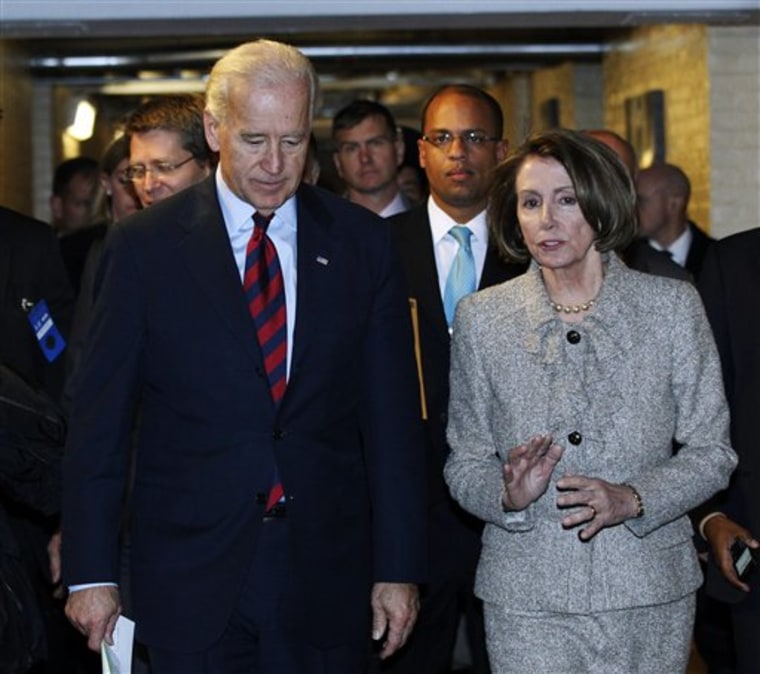House Majority Leader Steny Hoyer said Thursday congressional Democrats have no choice but to accept the tax package negotiated by President Barack Obama and GOP lawmakers, even as some fellow Democrats continue to resist.
"We're going to have an increase in taxes on working Americans ... if we continue to have gridlock," said Hoyer, a Maryland Democrat.
He said that continuing to fight the deal because it includes cuts for the wealthy would put tax cuts for middle- and lower-income people at risk, and jeopardize unemployed workers who badly need jobless benefits.
Speaking Thursday at a White House promoting American exports, Obama said the vote will determine whether the economy "moves forward or backward."
The president again pressed Congress to pass the agreement, saying it has the potential to create millions of jobs. He said if it fails, Americans would see smaller paychecks and would result in fewer jobs.
'The jury is still out'
But Rep. Chris Van Hollen, D-Md., said "the jury is still out" on the measure's enactment because many Democrats are furious over an estate tax provision.
Obama agreed to exempt the first $5 million of a deceased person's estate, and to tax the rest at 35 percent. Congressional Democrats had expected a 45 percent tax rate on anything above $3.5 million. Without congressional action, the estate tax will revert to an even higher rate: 55 percent on estates valued above $1 million. That should have strengthened Obama's hand when negotiating with Republicans, Van Hollen said.
Still, many congressional Democrats were grudgingly edging closer to embracing Obama's tax cut compromises, which would let rich and poor Americans keep Bush-era tax cuts that were scheduled to expire this month. Even so, 54 House Democrats wrote a letter to House Speaker Nancy Pelosi saying they're opposing the deal.
Led by Rep. Peter Welch of Vermont, they said they were against "acceding to Republican demands to extend the Bush tax cuts to millionaires and billionaires."
"We're paying a king's ransom," Welch said in an interview. "We didn't need to and couldn't afford to."
The 54 Democrats, by themselves, would not be enough to block the package in the House, depending on how much support it gets from Republicans.
After Obama publicly defended the plan for a third day Wednesday, and Vice President Joe Biden met with Democratic lawmakers in the Capitol for a second day, several Democrats predicted the measure will pass, mainly because of extensive Republican support.
Rep. Barney Frank, D-Mass., predicted the tax cut compromise "will be passed by virtually all the Republicans and a minority of Democrats." He said he would vote against it.
Even among Democrats, "there's more support in the caucus than there appears," Rep. Gerald Connolly of Virginia told reporters after he and fellow Democrats met with Biden. "I think some people felt they had to vent."
Obama said more congressional Democrats would climb aboard as they studied details of the $900 billion year-end measure.
Raising the direst alarm yet, his administration warned fellow Democrats that if they defeat the plan, they could jolt the nation back into recession.
White House uses some scare tactics
Larry Summers, Obama's chief economic adviser, told reporters that if the measure isn't passed soon, it will "materially increase the risk the economy would stall out and we would have a double-dip" recession. That put the White House in the unusual position of warning its own party's lawmakers they could be to blame for calamitous consequences if they go against the president.
With many House and Senate Republicans signaling their approval of the tax cut plan, the White House's comments were aimed mainly at House Democrats who feel Obama went too far in yielding to Republicans' demands for continued income tax cuts and lower estate taxes for the wealthy.
Obama says the compromise was necessary because Republicans were prepared to let everyone's taxes rise and to block the extension of unemployment benefits for jobless Americans if they didn't get much of what they wanted.
Economists say the recent recession officially ended in June 2009. But with unemployment at 9.8 percent, millions remain out of work or fearful of losing ground economically, and the notion of the nation falling back into a recession would strike many as chilling. It also could rattle markets and investors.
The deal Obama crafted with Senate Republican leaders would prevent the scheduled Dec. 31 expiration of all the Bush administration's tax cuts enacted in 2001 and 2003, even though Obama had often promised to end the cuts for the highest earners.
House Democrats, who will lose their majority in January, still hold a 255-179 edge in the current Congress. To pass a big bill with mostly Republican votes would mark a dramatic departure from recent battles, such as the health care overhaul, which was enacted with virtually no GOP support in either chamber.
Passage of Obama's plan seems more assured in the Senate, where numerous Democrats have agreed that the president had little choice in making the compromises with Republicans. Still, Majority Leader Harry Reid, D-Nev., said he and colleagues are considering possible changes, and action could come within days.
Changes designed to ease some Democrats' concerns might include a provision for bonds to help state and local governments pay for construction projects, tax breaks for wind power and clean-energy subsidies, lawmakers said.
Hoyer made his remarks in an interview on MSNBC.
